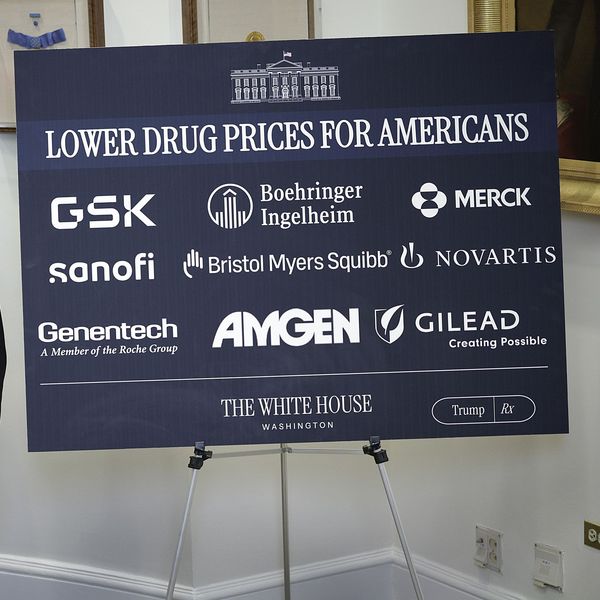The Class War on Drug Users
Philip Seymour Hoffman's death at the end of a heroin needle again spotlights the dangers of a poisonous drug. And so did the Vermont governor's plea last month to confront the "full-blown heroin crisis" plaguing his rural state.

His population is far poorer and more isolated than an Oscar-winning actor in New York's Greenwich Village. But though drug overdoses are democratic in choosing victims, the War on Drugs is anything but.
Every year, billions of dollars pours down the War on Drugs drain, and the drugs are cheaper and easier to find than ever. The war enriches dealers by constricting the supply while turning addicts into criminals afraid to publicly confront their drug use.
Vermont Gov. Peter Shumlin wants to use the moment of arrest as an opportunity to steer drug users into treatment instead of prison. He wants to treat addiction as the medical problem it is.
That approach costs far less. Jailing someone in Vermont for a week costs $1,120. A week at a state drug treatment center costs $123.
Our less than compassionate conservatives can't get this in their head. With some noble exceptions, Republicans remain intent on treating drug users as reprobates, especially if they are poor.
Note the reasoning of Trey Radel, the Florida tea party Republican recently convicted for cocaine possession. The then House rep was under the impression that with some inpatient treatment and prayer, he would become "a better man for southwest Florida" and pick up where he left off.
Resign in disgrace? Not him; he had a "disease." Join the half-million Americans in prison for drug violations? Never considered. (Radel eventually gave in to pressure and quit the House seat.)
Not long before, Radel had joined fellow Republicans in a vote requiring food stamp applicants to pass drug tests before receiving benefits.
So continues a non-compassionate tradition of making life harder for those already having it hard. Two years ago, for example, Rep. Jack Kingston, R-Ga., proposed forcing states to drug-screen applicants for unemployment insurance.
In 1998, then-Rep. Mark Souder, R-Ind., pushed through an amendment to the Higher Education Act that denied federal aid to any student having committed a drug offense. A Souder spokesman explained, "American taxpayers should not be subsidizing the educations of convicted drug dealers or drug users."
Oddly, rapists, armed robbers and even murderers who had done their time qualified for college aid. The law was later modified to punish only those who committed drug offenses while in college.
Of course, the drug-offending children of rich parents were not affected, because they didn't need student aid. They were also less likely to get caught and, if they did, could afford better lawyers. But hundreds of thousands of low- and moderate-income students were denied federal aid, often for being found with a stick of marijuana.
(Souder left Congress in 2010 when it was learned that he had an affair with a female staffer.)
Different rules certainly apply at the top of the power pyramid. Avid drug warrior George W. Bush had admitted to smoking pot and refused to deny cocaine use -- while assuming none of this should disqualify him from being president.
The current White House occupant, Barack Obama, confessed to using both substances. Obama has not been a tiger on changing the drug laws, though he's going easier on marijuana.
The War on Drugs is above all a Class War on Drug Users. Conceding this ugly reality is the first step in recovery toward a fair drug policy -- and one that might do some good.
An Urgent Message From Our Co-Founder
Dear Common Dreams reader, The U.S. is on a fast track to authoritarianism like nothing I've ever seen. Meanwhile, corporate news outlets are utterly capitulating to Trump, twisting their coverage to avoid drawing his ire while lining up to stuff cash in his pockets. That's why I believe that Common Dreams is doing the best and most consequential reporting that we've ever done. Our small but mighty team is a progressive reporting powerhouse, covering the news every day that the corporate media never will. Our mission has always been simple: To inform. To inspire. And to ignite change for the common good. Now here's the key piece that I want all our readers to understand: None of this would be possible without your financial support. That's not just some fundraising cliche. It's the absolute and literal truth. We don't accept corporate advertising and never will. We don't have a paywall because we don't think people should be blocked from critical news based on their ability to pay. Everything we do is funded by the donations of readers like you. Will you donate now to help power the nonprofit, independent reporting of Common Dreams? Thank you for being a vital member of our community. Together, we can keep independent journalism alive when it’s needed most. - Craig Brown, Co-founder |
Philip Seymour Hoffman's death at the end of a heroin needle again spotlights the dangers of a poisonous drug. And so did the Vermont governor's plea last month to confront the "full-blown heroin crisis" plaguing his rural state.

His population is far poorer and more isolated than an Oscar-winning actor in New York's Greenwich Village. But though drug overdoses are democratic in choosing victims, the War on Drugs is anything but.
Every year, billions of dollars pours down the War on Drugs drain, and the drugs are cheaper and easier to find than ever. The war enriches dealers by constricting the supply while turning addicts into criminals afraid to publicly confront their drug use.
Vermont Gov. Peter Shumlin wants to use the moment of arrest as an opportunity to steer drug users into treatment instead of prison. He wants to treat addiction as the medical problem it is.
That approach costs far less. Jailing someone in Vermont for a week costs $1,120. A week at a state drug treatment center costs $123.
Our less than compassionate conservatives can't get this in their head. With some noble exceptions, Republicans remain intent on treating drug users as reprobates, especially if they are poor.
Note the reasoning of Trey Radel, the Florida tea party Republican recently convicted for cocaine possession. The then House rep was under the impression that with some inpatient treatment and prayer, he would become "a better man for southwest Florida" and pick up where he left off.
Resign in disgrace? Not him; he had a "disease." Join the half-million Americans in prison for drug violations? Never considered. (Radel eventually gave in to pressure and quit the House seat.)
Not long before, Radel had joined fellow Republicans in a vote requiring food stamp applicants to pass drug tests before receiving benefits.
So continues a non-compassionate tradition of making life harder for those already having it hard. Two years ago, for example, Rep. Jack Kingston, R-Ga., proposed forcing states to drug-screen applicants for unemployment insurance.
In 1998, then-Rep. Mark Souder, R-Ind., pushed through an amendment to the Higher Education Act that denied federal aid to any student having committed a drug offense. A Souder spokesman explained, "American taxpayers should not be subsidizing the educations of convicted drug dealers or drug users."
Oddly, rapists, armed robbers and even murderers who had done their time qualified for college aid. The law was later modified to punish only those who committed drug offenses while in college.
Of course, the drug-offending children of rich parents were not affected, because they didn't need student aid. They were also less likely to get caught and, if they did, could afford better lawyers. But hundreds of thousands of low- and moderate-income students were denied federal aid, often for being found with a stick of marijuana.
(Souder left Congress in 2010 when it was learned that he had an affair with a female staffer.)
Different rules certainly apply at the top of the power pyramid. Avid drug warrior George W. Bush had admitted to smoking pot and refused to deny cocaine use -- while assuming none of this should disqualify him from being president.
The current White House occupant, Barack Obama, confessed to using both substances. Obama has not been a tiger on changing the drug laws, though he's going easier on marijuana.
The War on Drugs is above all a Class War on Drug Users. Conceding this ugly reality is the first step in recovery toward a fair drug policy -- and one that might do some good.
Philip Seymour Hoffman's death at the end of a heroin needle again spotlights the dangers of a poisonous drug. And so did the Vermont governor's plea last month to confront the "full-blown heroin crisis" plaguing his rural state.

His population is far poorer and more isolated than an Oscar-winning actor in New York's Greenwich Village. But though drug overdoses are democratic in choosing victims, the War on Drugs is anything but.
Every year, billions of dollars pours down the War on Drugs drain, and the drugs are cheaper and easier to find than ever. The war enriches dealers by constricting the supply while turning addicts into criminals afraid to publicly confront their drug use.
Vermont Gov. Peter Shumlin wants to use the moment of arrest as an opportunity to steer drug users into treatment instead of prison. He wants to treat addiction as the medical problem it is.
That approach costs far less. Jailing someone in Vermont for a week costs $1,120. A week at a state drug treatment center costs $123.
Our less than compassionate conservatives can't get this in their head. With some noble exceptions, Republicans remain intent on treating drug users as reprobates, especially if they are poor.
Note the reasoning of Trey Radel, the Florida tea party Republican recently convicted for cocaine possession. The then House rep was under the impression that with some inpatient treatment and prayer, he would become "a better man for southwest Florida" and pick up where he left off.
Resign in disgrace? Not him; he had a "disease." Join the half-million Americans in prison for drug violations? Never considered. (Radel eventually gave in to pressure and quit the House seat.)
Not long before, Radel had joined fellow Republicans in a vote requiring food stamp applicants to pass drug tests before receiving benefits.
So continues a non-compassionate tradition of making life harder for those already having it hard. Two years ago, for example, Rep. Jack Kingston, R-Ga., proposed forcing states to drug-screen applicants for unemployment insurance.
In 1998, then-Rep. Mark Souder, R-Ind., pushed through an amendment to the Higher Education Act that denied federal aid to any student having committed a drug offense. A Souder spokesman explained, "American taxpayers should not be subsidizing the educations of convicted drug dealers or drug users."
Oddly, rapists, armed robbers and even murderers who had done their time qualified for college aid. The law was later modified to punish only those who committed drug offenses while in college.
Of course, the drug-offending children of rich parents were not affected, because they didn't need student aid. They were also less likely to get caught and, if they did, could afford better lawyers. But hundreds of thousands of low- and moderate-income students were denied federal aid, often for being found with a stick of marijuana.
(Souder left Congress in 2010 when it was learned that he had an affair with a female staffer.)
Different rules certainly apply at the top of the power pyramid. Avid drug warrior George W. Bush had admitted to smoking pot and refused to deny cocaine use -- while assuming none of this should disqualify him from being president.
The current White House occupant, Barack Obama, confessed to using both substances. Obama has not been a tiger on changing the drug laws, though he's going easier on marijuana.
The War on Drugs is above all a Class War on Drug Users. Conceding this ugly reality is the first step in recovery toward a fair drug policy -- and one that might do some good.

